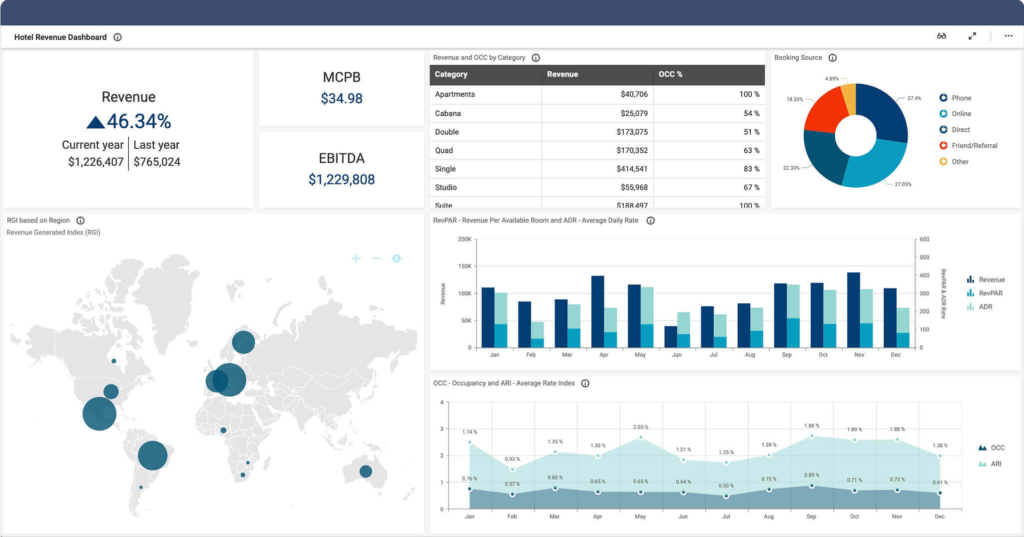The world of business intelligence is constantly evolving, and the future seems brighter than ever. As technology advances and businesses become more data-driven, the need for sophisticated business intelligence tools and strategies is becoming increasingly important. The question on everyone’s mind is, what does the future hold for business intelligence?
One thing is for sure – the demand for big data analytics and business intelligence software will continue to rise. With the explosion of data from sources such as social media, mobile devices, and the Internet of Things (IoT), businesses will need to leverage advanced analytics to make sense of it all. The future of business intelligence will be characterized by the ability to collect, organize, and analyze data in real-time, enabling companies to make informed decisions quickly and effectively. This will require the adoption of cutting-edge technologies such as machine learning and artificial intelligence, which will allow businesses to automate processes and gain deeper insights into their operations.

What is Business Intelligence?
Business intelligence is a type of technology that is used to gather, analyze, and interpret data for businesses. It uses data from various sources, such as customer surveys, market research, and financial data, to gain insights into customers, products, and markets. Business intelligence is used to help businesses make data-driven decisions and improve their operations.
The Future of Business Intelligence
Data Collection and Analysis
The future of business intelligence lies in the ability to collect and analyze data more quickly and accurately. With the advancement of technology, data can be collected from a variety of sources and analyzed in real-time. This allows businesses to make decisions faster and with more accuracy. Additionally, new technologies such as artificial intelligence are being used to help businesses make predictions about future trends and customer behavior.
Data Visualization
Data visualization is an important aspect of business intelligence and is used to present data in a visually engaging way. With advancements in technology, businesses can now create interactive dashboards that make it easier to understand complex data. This allows businesses to quickly identify trends and make decisions based on the data. Additionally, data visualization tools can be used to create customized reports and presentations for stakeholders.
Cloud Computing
Cloud computing is another important aspect of business intelligence. With cloud computing, businesses can access data from anywhere at any time and can store vast amounts of data in a secure environment. This allows businesses to access the data they need quickly and easily, and it also enables them to scale their operations as needed. Additionally, cloud computing allows businesses to reduce their costs as they do not have to purchase and maintain their own data centers.
Data Security
Data security is essential for businesses as they are collecting, storing, and analyzing sensitive data. As such, businesses need to ensure that their data is secure and protected from unauthorized access. This can be done through the use of encryption and other security measures. Additionally, businesses need to ensure that their data is not shared with third parties without their consent.
Artificial Intelligence
Artificial intelligence is becoming increasingly important for businesses as it can be used to automate processes and make decisions faster and more accurately. AI can be used to analyze vast amounts of data and identify patterns as well as trends. Additionally, AI can be used to provide personalized recommendations and make predictions about customer behavior. This allows businesses to better understand their customers and make decisions accordingly.
Big Data
Big data is a term used to describe large sets of data that can be used for analysis and decision-making. Big data can be used to gain insights into customer behavior, market trends, and much more. Additionally, big data can be used to identify opportunities for growth and optimization. This allows businesses to make data-driven decisions and make the most of their resources.
Predictive Analytics
Predictive analytics is used to analyze data and make predictions about the future. Predictive analytics can be used to identify trends, forecast demand, and make decisions about product development and pricing. This allows businesses to stay ahead of the competition and make decisions based on data rather than guesswork. Additionally, predictive analytics can be used to identify potential risks and opportunities that may be overlooked.
Machine Learning
Machine learning is a type of artificial intelligence that is used to analyze data and make predictions. Machine learning algorithms can be used to identify patterns in data, classify data, and make predictions about future events. This allows businesses to make decisions faster and more accurately, as well as make predictions about customer behavior. Additionally, machine learning can be used to automate processes and optimize operations.
Frequently Asked Questions
Business Intelligence (BI) is the process of collecting, storing, and analyzing data to make better decisions and create more effective strategies. It involves the use of technology and data to gain insights into customer behavior, business performance, and other important aspects of a business.
What is the Future of Business Intelligence?
The future of Business Intelligence (BI) is bright. With advances in technology and the increasing availability of data, businesses are now able to gain more insights into their operations and make more informed decisions. As businesses become increasingly data-driven, BI will become even more integral to their success. BI solutions are also becoming more user-friendly, allowing businesses to quickly and easily access and analyze data.
The future of BI will also be driven by Artificial Intelligence (AI). AI-driven BI solutions are becoming increasingly popular, allowing businesses to leverage the power of machine learning to gain deeper insights into their operations. AI-driven solutions can also automate many of the tedious tasks associated with data analysis, freeing up time and resources for businesses to focus on strategic objectives. Ultimately, the future of BI is one of greater data-driven insights and improved decision making.

In conclusion, the future of business intelligence is bright and promising. With the increasing amount of data generated by businesses and the advancement of technology, the need for efficient and effective data analysis tools will only continue to grow. The development of artificial intelligence and machine learning algorithms will further enhance the capabilities of business intelligence software, allowing companies to make more informed decisions and gain a competitive edge in their respective industries.
However, it is important to note that the success of business intelligence ultimately depends on the ability of businesses to effectively implement and utilize these tools. Companies must invest in the necessary resources and training to ensure that their employees are equipped with the skills and knowledge needed to maximize the potential of business intelligence. With the right approach and mindset, the future of business intelligence holds endless possibilities for businesses looking to thrive in a data-driven world.


